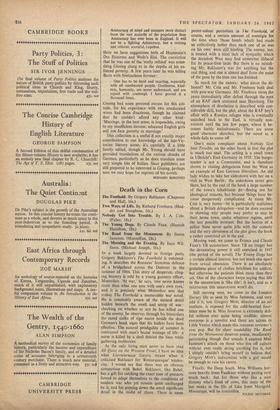Death in the Corn
IN a week largely devoted to foreign parts, Grigory Baklanov's The Foothold is outstand- ing. It describes the Russians' ferocious defence of a bridgehead across the Dniester in the summer of 1944. This story of desperate, cling- ing bravery is told by a young gunnery officer, Motovilov. 'At war,' he says, 'one never knows more than what one sees with one's own eyes,' and it is precisely what Motovilov sees that makes The Foothold a memorable war novel. He is constantly aware of the natural detail hidden beneath the smell and smog of war: checking on whether or not he has killed one of the enemy, he observes through his binoculars the razed stalks of ripe maize beside the dead German's head, signs that his bullets have been effective. The natural prodigality of summer is contrasted with man's brutal wastage of life: a nurse is killed by a shell lfehind the lines while gathering mulberries.
As the only living man never to have read All Quiet on the Western Front, I have no idea what Literaturnaya Gazeta meant when it criticised Baklanov for 'Remarquesque' tenden- cies: I would say that there was an obvious comparison with Babel. Baklanov, like Babel, has a gift for catching the exact tone of peasants forced to adapt themselves to the conditions of modern war who yet remain quite unchanged by it, and for pinning down the small significant detail in the midst of chaos. There is some poster-colour patriotism in The Foothold, of course, and a certain amount of nostalgia for
the time when 'those bonds which had made us collectively better than each one of us was on his own' were still binding The enemy, too, is treated with a total lack of sympathy which the decadent West may find somewhat illiberal for its peace-time taste. But there is no mistak- ing Mr. Baklanov's war for anything but the real thing, and one is almost deaf from the noise of the guns by the time one has finished So much for the victors: what about the de- • feated? Mr. Cole and Mr. Freeborn both deal with post-war Germany. Mr. Freeborn views the years immediately after defeat through the eyes of an RAF clerk stationed near Hamburg. The atmosphere of desolation is described with con- siderable skill, but the plot, about the RAF boy's affair with a Russian refugee who is eventually snatched back to the East, is virtually non- existent until the last few pages, where it be- comes feebly melodramatic. There are some good character sketches, but the novel as a whole fails to come off
One's main complaint about Nobody Got Into Trouble, on the other hand, is that the plot is much too neat. The setting is a small town in Ulbricht's East Germany in 1953. The burgo- master is not a Communist, and is therefore shown to visiting delegations from the West as an example of East German liberalism. An old lady wishes to take her eiderdown with her on a visit to West Berlin: the eiderdown never gets there, but by the end of the book a large number of the town's inhabitants do—fleeing not for ideological reasons, but because things have be- come dangerously complicated. At times Mr. Cole is very funny—he is particularly malicious about a British delegation—and he does succeed in showing why people may prefer to stay in their home town, under whatever regime, until the last possible moment. But the horror of a police State never quite jells with the comedy and the very cleverness of the plot gives the book a rather contrived air in the end.
Moving west, we come to France and Claude Faux's TB sanatorium. Since TB no longer has the devastating power it still exercised in 1947 (the period of the novel), The Young Dogs has a certain clinical interest, but not much else apart from sexual obsession. There is an absolutely gratuitous piece of clothes fetichism for addicts, but otherwise the patients think more than they act. One of the characters keeps saying that life in the sanatorium is 'like life': it isn't, and as a microcosm this sanatorium won't do.
Still moving west, we come to the London literary life as seen by Miss Jameson, and very odd it is, too. Gregory Mott, director of an art institute, is exposed for the cold-hearted four- letter man he is. Miss Jameson is extremely skil- ful without ever quite being credible; almost everyone is a novelist and there are salons in Little Venice which made this innocent reviewer's eyes pop. But for sheer readability The Road from the Monument deserves praise, insufferably patronising though that sounds. I enjoyed Miss Jameson's attack on those who live off culture without ever really doing anything for it, but
simply couldn't bring myself to believe that Gregory Motes indiscretion with a girl would be enough to ruin his career.
Finally, the Deep South. Miss Williams bor- rows heavily from Faulkner without paying very much back: but for those who like a nice dummy who's fond of cows, this story of the last weeks in the life of Jake from Marigold, Mississippi, will be irresistible.
JULIAN MITCHELL






































 Previous page
Previous page